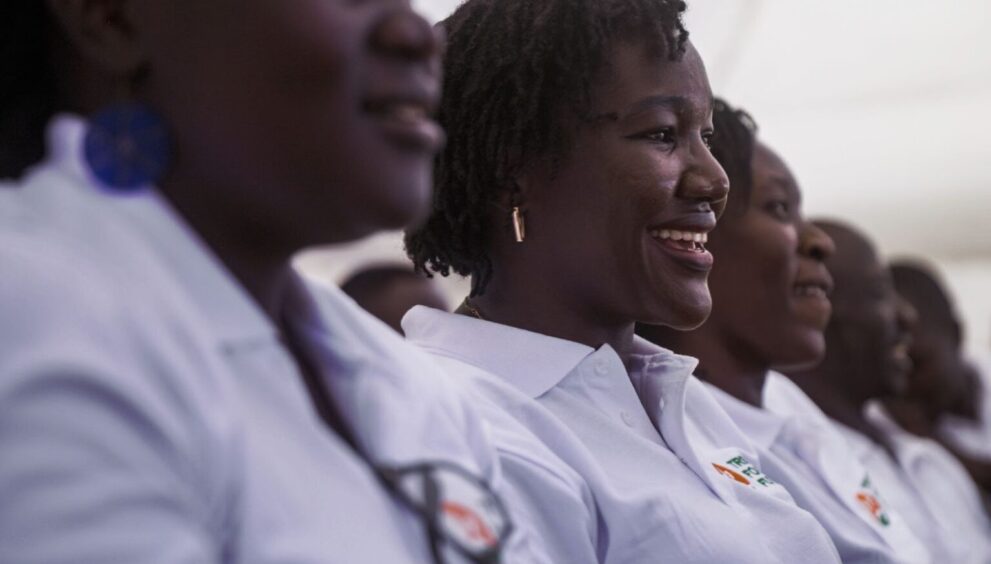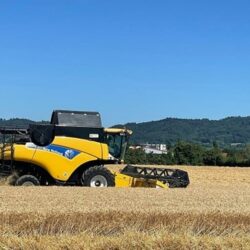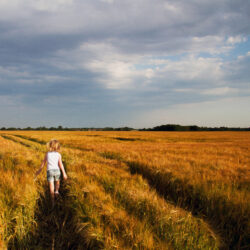After four years of supporting farmer training, Trees for the Future (TREES), in partnership with Catona Climate, is proud to announce the graduation of over 1,300 farmers from its transformative United Nations-recognized Forest Garden Program in Homa Bay, Kenya. Part of an innovative agroforestry project that will remove atmospheric carbon dioxide through gains in tree biomass and soil carbon enhancements, the graduation represents a four-year journey of intense training in sustainable agroforestry practices, Forest Garden planning and design, implementation of techniques such as composting, grafting, crop rotation, cover cropping, integrated pest management, knowledge sharing, farmer-to-farmer learning, and cooperative entrepreneurial initiatives among farmer cohorts.
A first of its kind, the Lake Victoria Watershed Agroforestry Project in Homa Bay, Kenya, partners with over 15,000 local smallholder farmers to develop Forest Gardens — multi-tiered agroforestry systems of trees, shrubs, and crops — on their land. The program enables participant farmers to improve food security and nutrition through sustainable access to nutrient-rich fruits and vegetables, generate income through increased crop yields, and invest in themselves, their families, and their communities.
The graduation ceremony, held on September 14, 2024, was a capstone for the next cohort of farmers in the program, bringing together their families, government leaders from the Ministry of Environment, Energy, Forestry and Climate Change, the National Environmental Management Agency, as well as county commissioners and community chiefs to celebrate this milestone.
Rob Lee, Chief Carbon Officer of Catona Climate, at the graduation ceremony (bottom, in red shirt) and Vincent Mainga, Director of Kenya Programs at Trees for the Future (black suit jacket). Photo: Trees for the Future
Throughout the Forest Garden Program, participating farmers are reversing the impacts of deforestation and land degradation. The program, which is a unique blend of sustainable farming techniques and entrepreneurial training, has equipped farmers with the tools and knowledge needed to increase food security, earn additional income, and maintain more climate-resilient, biodiverse farms.
The impacts of the project are already starting to take root. In an innovative pilot bioacoustic study, over 100 different species of birds, amphibians, and insects were identified across 70 Forest Garden sampling sites – including the endangered grey crowned crane. The study supports the hypothesis that as farmers transition away from traditional farming to agroforestry systems and develop mature Forest Gardens, biodiversity levels increase.
“These 1,300 graduates are proof that sustainable agriculture is not only possible but a pathway to prosperity,” said Mercy Karunditu, Director of Field Programs for Trees for the Future. “Their hard work and dedication, supported by the partnership with Catona Climate, have brought tangible improvements to their lives and their land.”
This cohort of graduates is now equipped to continue building on their success. Many farmers are reporting increased crop yields, improved nutrition, and access to new income streams such as selling surplus crops at local markets, harvesting seeds to sell back to the program, and launching new entrepreneurial pursuits with their added income, further fueling economic growth in their communities.
Farmers like Dorothy Onyango, who shared her experience at the ceremony, are leading the way in their communities. “I joined with my family when the land was not productive leading to low harvest,” said Dorothy. “I have noticed changes in the soil through production since I joined. This is because I have been trained well on making and using compost, and now I have realized an increase in fertility and moisture of my soils as well as better production yield.” Since joining the program, Dorothy has taken advantage of additional income opportunities. “In my Forest Garden, I love the trees the most because of the seed production and supply I am currently doing which I sell. I have managed to pay school fees for two of my grandchildren.”
The cohort of 1,303 farmers was made up of 62% women, with young farmers comprising 25% of the graduates. Together, they have restored 568 hectares of land and planted over 4.7 million trees. The ripple effect of their achievements is anticipated to reach approximately 8,920 members of the surrounding community, who will benefit either directly or indirectly from the project’s activities.
“By adopting agroforestry techniques, these farmers are creating more resilient landscapes, securing their livelihoods, and contributing to the global climate solution,” said Tate Mill, CEO of Catona Climate. “Their accomplishments inspire hope, not only for their communities but for the future of our planet.”
TREES will continue growing its scalable Forest Garden Program across Kenya and beyond, aiming to restore 229,000 hectares (with over 41,000 already restored), creating 230,000 green jobs by 2030. Additionally, TREES and Catona intend to scale the carbon project across Kenya and beyond. The success of the Homa Bay graduates and the special guests in attendance highlighted the importance of partnerships between local communities, government, and organizations like Catona Climate in addressing land degradation, food insecurity, and climate change.




